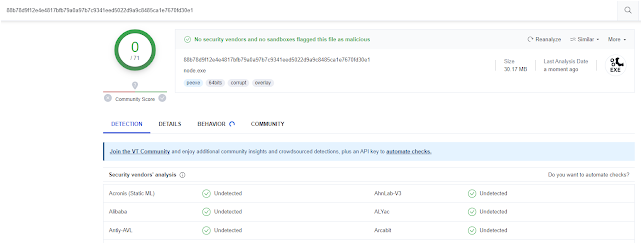Electron_Shell – Developing A More Covert Remote Access Trojan (RAT) Tool By Leveraging Electron’s Features For Command Injection And Combining It With Remote Control Methods
Electron_shell
Read More: [AOH 024]探索将Shell寄生于Electron程序的自动化实现
Features
-
Supports almost all operating systems
- mac
- linux
- windows
-
Supports almost all desktop applications developed based on Electron
- Microsoft Team
- Discord
- GitHubDesktop
- 淘宝直播
- vscode
- and more (https://en.wikipedia.org/wiki/List_of_software_using_Electron)
-
All malicious operations are executed by the injected program, those commonly used trusted programs
-
Bypass of Network Access Control Policy for Applications by Zero Trust Sandbox
-
Verified that it will not be discovered by the antivirus software below
(Please note that a simple command call has been implemented here, and some behavior based heuristic checks will still prompt , bypass AV is not a key issue to be addressed in this project)
Intro
An increasing number of desktop applications are opting for the Electron framework.
Electron provides a method that can be debugged, usually by utilizing Chrome’s inspect function or calling inspect through Node.js. In this project, the implementation of inspect was analyzed, and a method for automatically parasitizing common Electron programs was developed.
By establishing a connection with the Command and Control (C2) server, a simple remote control is achieved.
Due to the widespread trust of most antivirus software in these well-known applications (with digital signatures), executing malicious commands in the program context provides excellent concealment and stability.
For these injected applications, it is necessary to carefully consider the potential legal risks brought by such actions. When users analyze program behavior, they may be surprised to find that the parent process executing malicious behavior comes from the application they trust.
Usage
C2 Server Setup
- Deploy a server and obtain a public IP address
- and then exec command:
nc -lvnp 8899
Generating Implants
-
clone this project
-
modify build.config
injected_app: The electron program you want to inject
c2: set c2_Public IP and c2_netcat Port -
exec
node build.js, and then pkg to an execute program -
Send to victim, and get electron_shell
A considerable amount of time and effort goes into maintaining this website, creating backend automation and creating new features and content for you to make actionable intelligence decisions. Everyone that supports the site helps enable new functionality.
If you like the site, please support us on “Patreon” or “Buy Me A Coffee” using the buttons below
To keep up to date follow us on the below channels.



